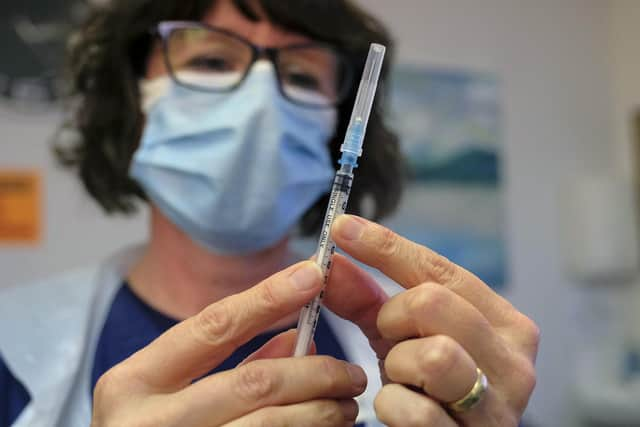Polio Sheffield: Why is it a problem, what is it, and who gives vaccines?
and live on Freeview channel 276
But what is it, why is it a problem, and who does vaccines in Sheffield?
Polio, which was officially eradicated in the UK in 2003, can cause paralysis in rare cases and can be life-threatening.


Advertisement
Hide AdAdvertisement
Hide AdThe last case of natural polio infection acquired in the UK was in 1984.
The virus that has caused concern is a strain of the weakened poliovirus, that was initially included in the oral polio vaccine, which has changed over time and behaves more like the "wild" or naturally-occurring virus.
This means it can be spread more easily to people who are unvaccinated and who come into contact with the faeces or coughs and sneezes of an infected person.
Experts are looking at the possibility that just one family or extended family may be affected, though it is unclear how many people need to be infected for polio to be detected in sewage samples.
Advertisement
Hide AdAdvertisement
Hide AdThe UKHSA stressed that the virus has only been detected in sewage samples and no cases of paralysis have been reported.
It is now investigating the extent of community transmission and has established a "national incident" to check for cases elsewhere as a precaution.
Health Secretary Sajid Javid said he was "not particularly worried" about the detection of poliovirus.
Medics have now been alerted by UKHSA to look out for signs of polio paralysis.
Advertisement
Hide AdAdvertisement
Hide AdUrgent medical attention should be sought if people experience rapid onset of weakness in a limb, which will be floppy, or difficulties with breathing.
The UK stopped using live oral polio vaccine (OPV) in 2004 and switched to inactivated polio vaccine (IPV).
How many children in Sheffield are vaccinated against polio?
In 2020 it was reported dozens of babies were missing out on polio jabs in Sheffield, with vaccine uptake remaining below the level the World Health Organisation says is needed.
The WHO recommends at least 95 per cent of newborns should get the six-in-one jab, which protects against six serious infections including polio, whooping cough and diphtheria.
Advertisement
Hide AdAdvertisement
Hide AdBut 93.6 per cent of infants born in Sheffield who had their first birthday between January and March have been vaccinated, according to Public Health England data at that time
Who does polio vaccines in Sheffield?
Sheffield Children’s NHS Foundation Trust School Age Vaccination and Immunisation Team goes into schools in the city to give the vaccine to children in year nine with a three in one booster for Diphtheria, Tetanus and Polio.
Doses are also given before children start school
Sheffield Travel Health Clinic, based in the specialist department of Infection and Tropical Medicine at the Royal Hallamshire Hospital in Sheffield, is listed online as offering polio vaccines for £30.
What is Polio?
Polio is a serious infection that's now very rare as it can be prevented with vaccination.
Advertisement
Hide AdAdvertisement
Hide AdVaccination means polio is now very rare in most parts of the world. It's mainly found in two countries, Afghanistan and Pakistan.
Polio is caused by a virus that spreads easily when an infected person coughs or sneezes.
It can also be caught from food or water that's been in contact with the faeces of someone who has the virus.
The best way to prevent polio is to make sure you and your child are up to date with your vaccinations.
Advertisement
Hide AdAdvertisement
Hide AdThe polio vaccine is part of the NHS routine childhood vaccination schedule.
It's given when your child is eight, 12 and 16 weeks old as part of the six-in-one vaccine
Three years and four months old as part of the four-in-one pre-school booster
and at 14 years old as part of the three-in-one teenage booster
Advertisement
Hide AdAdvertisement
Hide AdYou need to have all of these vaccinations to be fully vaccinated against polio.
How can I get vaccinated against Polio?
You can have a polio vaccination at any point if you've never had one before, even if you're not travelling to a country with a risk of getting polio.
You should also get vaccinated even if you've had polio before as it protects against different types of polio.
It's usually free on the NHS.
What are the symptoms of polio?
Most people who get polio do not have symptoms.
Some people get mild, flu-like symptoms, such as a high temperature, extreme tiredness, vomiting, a stiff neck or muscle pain
These symptoms usually last up to 10 days.
Advertisement
Hide AdAdvertisement
Hide AdRarely, polio can cause paralysis, usually in the legs. This can happen over hours or days.
It's not usually permanent and movement will slowly come back over the next few weeks or months.
But it can be life threatening if the paralysis affects the muscles used for breathing.

